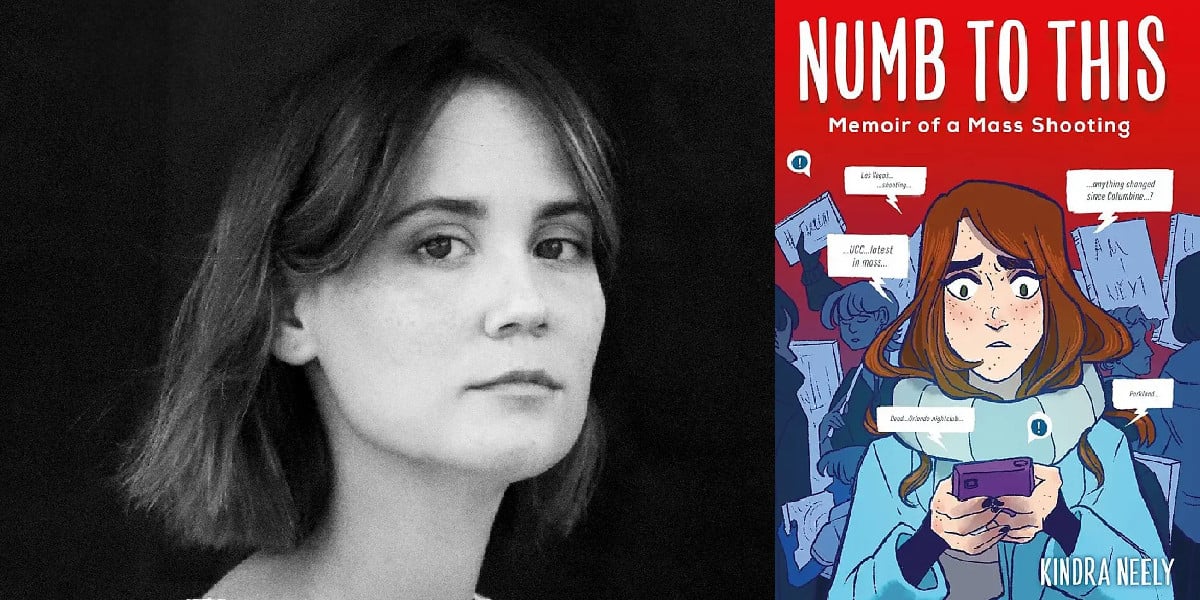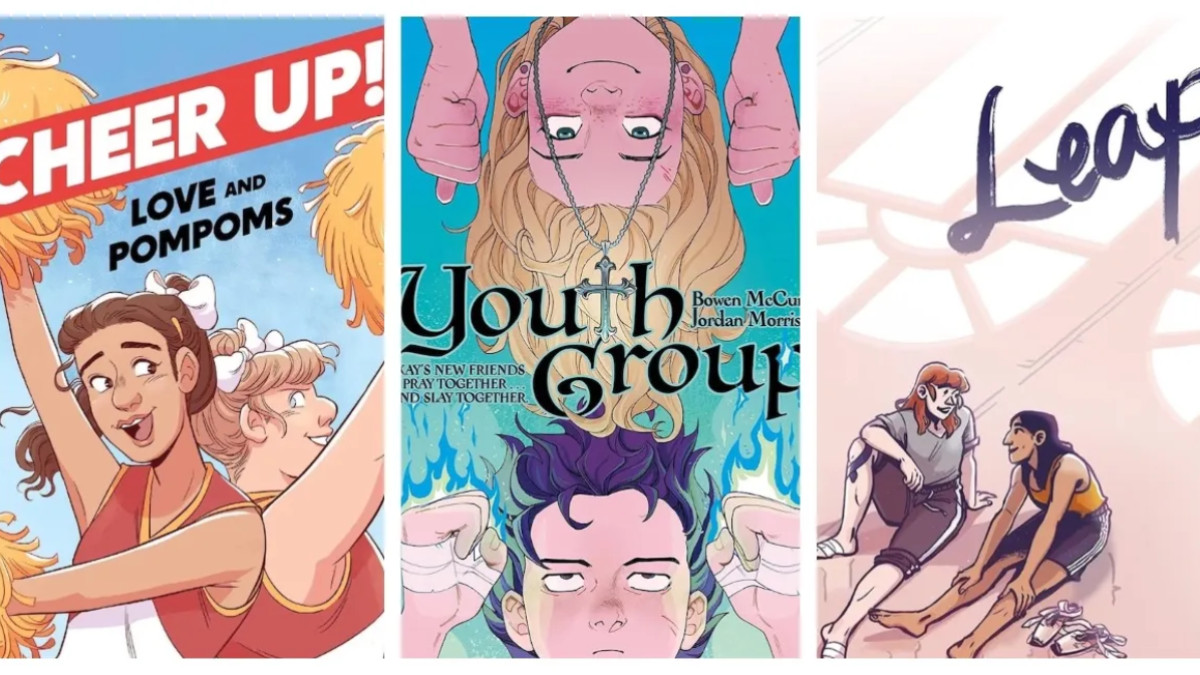Kindra Neely beautifully captures her journey of healing through art and her personal hope in her debut graphic memoir, Numb to This. Numb to This was released on October 11, 2022, and is a searing and heartbreaking look into Neely’s experience surviving a mass shooting and the aftermath of living through such trauma. Through stunning art, readers will see the impact of gun control and gun violence from a human and personal lens. It is a perspective that isn’t seen or heard nearly enough in a world where many are too invested in their opinions to listen to the stories that matter.
Numb to This follows Neely’s earlier life growing up in Texas before a drive-by shooting caused her and her mother to move to Oregon. Oregon was Neely’s mother’s hometown and she, too, began to think of it as home as she made friends, grew older, and graduated high school. Upon graduation, she decided to attend Umpqua Community College. However, on October 1, 2015, her life changed forever when an armed shooter opened fire on campus, taking the lives of 8 students and a professor. Neely is left trying to pick up the pieces of her life while struggling with trauma, fearing asking for help, and being struck with every subsequent incident of gun violence that occurs.
While Neely offers an honest and heartbreaking picture of the aftermath of living through trauma, she also captures small pieces of hope. She finds hope in her journey to art, learning to heal through art, and learning to ask for help. Additionally, she still very much believes that gun violence can be fixed. I had the honor to speak to Neely about her powerful graphic memoir debut. We talked about the importance of listening to others, maintaining sensitivity in the media, and her discovery of art and its healing power.
Rachel Ulatowski (TMS): Numb to This explores the necessity of listening. In a world where everyone has a story, how do people succeed in making themselves heard? Likewise, how do people with stories prevent themselves from disrupting the voices of others?
Kindra Neely: It took a really long time to feel like I was being heard and I think persistence in a world that moves through story and information quickly is key. There were plenty of times that I felt discouraged but each time I did feel seen by someone it was such a weight off my shoulders that I knew I wanted to create something that helped others feel seen too.
In terms of not speaking over or disrupting others, it can be difficult. I think there’s a mindfulness and a sort of humility that comes with both sharing and listening to others. In my mind, I see this book as a turn in a conversation rather than a speech. I’m not the authority on all things post-mass shooting, but I am a voice that adds pieces to the story that are not often seen.
TMS: How do survivors of gun violence perceive each subsequent mass shooting differently from those who haven’t experienced it?
Neely: There is a sort of intimate understanding, having been through it ourselves, of what the people of that community are going through and what they will go through in the subsequent months. It’s the difference between sympathy and empathy. For me, there’s a particular sort of grief and devastation in knowing that it’s happened to another person.
TMS: Numb to This gave readers several stomach-churning examples of insensitive, numb journalists who cared more about penning a breaking story than for the survivors of gun violence. What are some ways that journalists and the media can approach coverage of mass shootings in a more sensitive manner?
Neely: I think the golden rule of ‘’treat others how you’d like to be treated’’ applies really well here. It’s important for the story to get out there and for people to be informed, but not at the expense of further traumatizing and exploiting people in crisis. Would you want people coming to your home after you found out your family member was murdered? How would you feel if you were waiting in a classroom to be evacuated and a news channel was messaging you for details online?
I did have some good experiences with journalists from Roseburg that were very careful with what they asked, and treated the matter seriously. I guess there’s some disconnect with larger news sources interviewing or reporting on communities that are not their own.
TMS: In Numb to This, you chronicle your participation in March for Our Lives and how it wasn’t the healing experience you expected it to be. Can you tell us more about what the March for Our Lives meant for survivors of gun violence? In what ways was it “coming to a head” on gun violence and in what ways did it fall short for survivors?
Neely: I don’t know if I can speak to what March For Our Lives meant for other survivors or if and how it fell short for them. When we talk about survivors of gun violence, that is a large and diverse group of people and experiences ranging from mass shootings to police brutality and domestic violence. I think in the very least, having a physical show of support as large as that, gave a boost of confidence and security that this issue is important to society. I love that the March For Our Lives covered gun violence as a whole and not just mass shootings because they’re not separate issues. The same ideology and problems that are at the root of police brutality and domestic violence are also at the root of most mass shootings. That awareness of their intertwining helps others make those connections when they otherwise wouldn’t have.
TMS: When did you first discover your talent for art and how did it aid in your healing?
Neely: Like most people, I definitely loved to draw and create when I was younger. I didn’t start really exploring art until I was in college though. I took ceramics and a few courses at UCC and I just had a blast creating. Part of that earlier experience was working on a memorial mosaic at UCC for the students and professor that we lost that day. Almost from the beginning there was an intermingling of art and healing.
I loved working on that mosaic. There was an indescribable relationship between me and the act of service that I was doing. It gave me a place to sit unapologetically with grief and to offer the same once it was completed. Art really gave me a more fluid language to express emotions and feelings that I couldn’t otherwise say.
TMS: What kind of message do you hope your graphic novel will share with readers who have experienced trauma but are afraid to ask for help?
Neely: I hope it gives them the courage that it gave me. I hope that in seeing someone else struggle to find their way, they can see that it’s never too late to ask for help. No matter how dark or far you think you’ve fallen, there are people that will help you back up.
TMS: In your graphic novel, you mention feeling hopeless, rather than pointless, but that hopelessness is a better place to be because it means there is some belief. What beliefs or personal hopes do you still have regarding the issue of gun violence?
Neely: I firmly believe that gun violence in all its forms can be fixed. For some that might seem naïve or frivolously optimistic, but I don’t say that with the idea that it will be easy or simple. It’s going to take a lot of really difficult work and years of transition, but it’s doable.
There’s power in positivity when it’s coming from an authentic and grounded place. I hope to use that and my experience of getting there to help others reach that conclusion too.
You can find Numb to This via Little, Brown and Company and on Bookshop.
(featured image: Little, Brown and Company)









Published: Oct 13, 2022 11:34 am